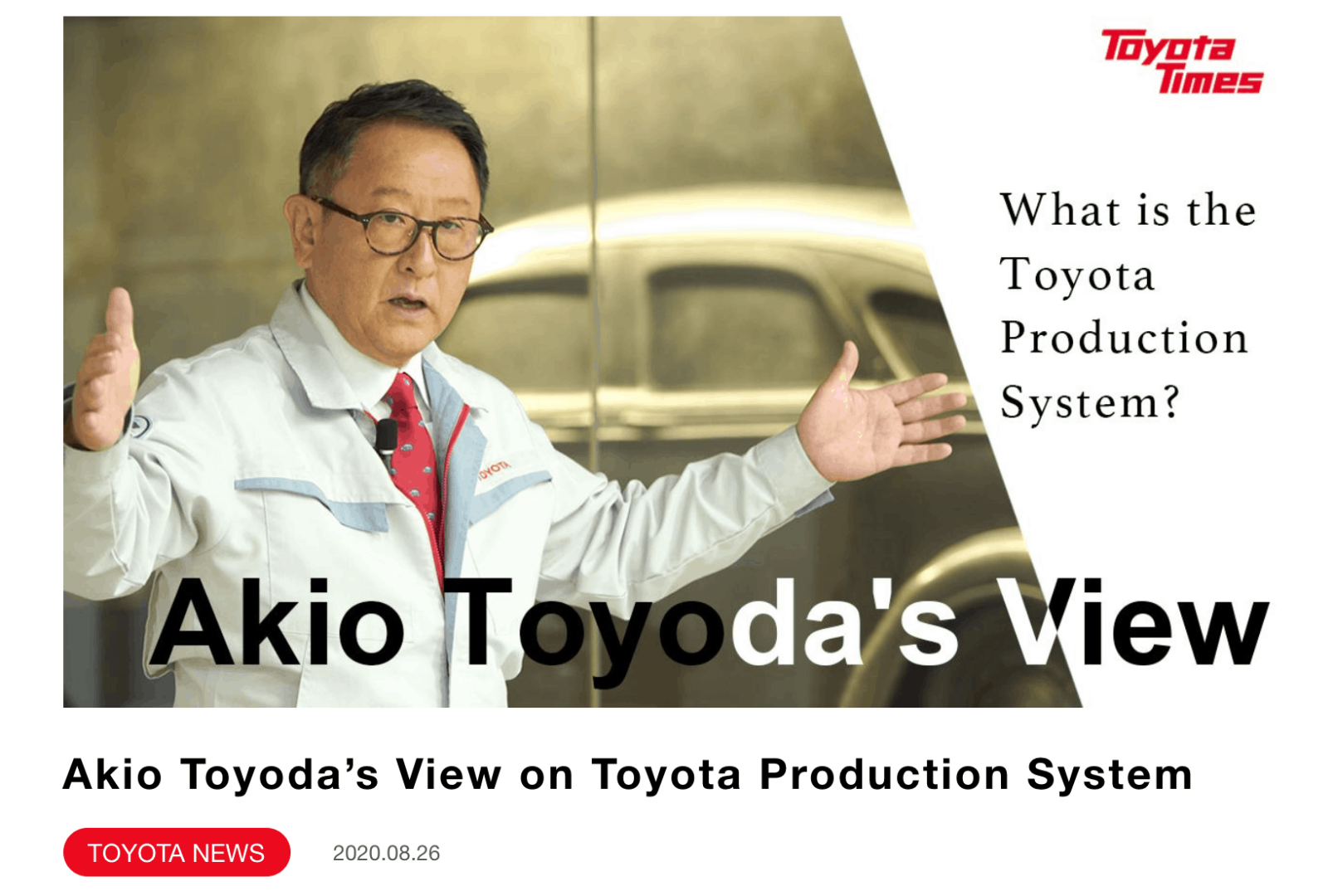I was really happy to see this publication by Toyota, from Japan but in English:
“Akio Toyoda's View on Toyota Production System“
There are seven sections:
- 1. Sakichi Toyoda looked to ease his mother's burdens
- 2. Improving productivity was not the main purpose
- 3. How Akio sees Jidoka (automation with a human touch)
- 4. How Akio sees Just-in-Time
- 5. Achieving lead time at Sushi restaurants?
- 6. “Genba” matters more than titles
- 7. Editorial Postscript | Doing things for others

What makes Toyota the company that it is?
“…one of the things [Akio Toyoda] repeatedly has said that makes us Toyota is the Toyota Production System, or what is often called “TPS” in short.”
Even Toyota conducts TPS training for leaders and the article recounts Akio Toyoda's remarks that were made to kick off the sesison.
Toyota recognizes, of course, that others teach about TPS outside of the company and in other settings. The remarks are framed as his version of TPS, basically.
This is an interesting point and change and problem solving:
“It is OK to have determination to make changes, but if you change everything without a solid concept or target, you may end up just making things worse.”
To me, that's why the Japanese word kaizen translates to mean “good change,” not just “change.
Toyoda asked the group what two concepts are really important at Toyota. After one attendee said “TPS and cost reduction,” the better answer was revealed:
“Participant B
I think they are “Just-in-Time” and “automation with a human touch”, or “Jidoka“Akio
That's it! This is what I wanted to hear! (everyone laughs)”
You can read more about this on Toyota's website about TPS.
Respect for People
Toyoda told a story from the company's early history when they made weaving looms…
“Often at Toyota, TPS is considered the process of making things efficient, and you talk about changing the way of work as the purpose of applying” it in that context. But I think the purpose should be to make someone's work easier, and I believe this is the most reasonable way of understanding what it really is about.”
I love that definition whether it's about Sakichi Toyoda making weaving easier for his mother, or when we work to make work easier in healthcare settings (and beyond).
People often think that productivity (or efficiency or cost) is the primary objective of TPS. This often gets misunderstood in the context of Lean:
Making work easier (and improving quality) might result in better productivity, as Toyoda explained:
“Sakichi aimed to create a system that would determine what the abnormalities were caused by and then coming up with ideas to prevent or stop such abnormalities. As a result, productivity improved.
It's not the other way around. It's not that he did all this just to improve productivity.”
Leaders can't just demand better productivity from their offices:
“You can't just make orders to improve efficiency or reduce resources while you are in a safe zone and not at the frontline.”
Showing the emphasis is on the workers, Toyoda says:
“Knowing this, supervisors must make the work being done by team members as meaningful as possible.”
This reminds me very much of one of the three questions that Paul O'Neill said every employee should be able to say “yes” to every day:
Can people say, “I'm given the things I need, education, and training, and financial support, and encouragement — that's really important — so that I can make a contribution to this organization that gives meaning to my life”?
Read more in the free PDF eBook about Mr. O'Neill or get it for 99 cents in the Amazon Kindle store.
This thinking is also the inspiration for Eric Ries writing, in The Lean Startup, that we shouldn't waste the time (or lives) of people who write code or otherwise work for us.
That's “respect for people,” to me.
Back to Toyoda:
“So my personal take on TPS is that it is “centered on people,” and this is the mindset I would like for all of you to take with you.”
Too many organizations just give lip service to employees being important — it's better when people development is truly the main focus, as you can read or hear about in the post and podcast below:
Because the company is focused on making work easier, focusing on waste reduction does not mean there are “harsh working conditions where no rest is allowed.”
Compare that to companies where working conditions are alleged to be harsh… places where employees pee into a bottle because they, sadly, don't have time for a proper bathroom break. Or look at allegations against Instacart, where employees are in constant fear of being fired for not hitting strict productivity targets:
Instacart shoppers say they face unforgiving metrics: ‘It's a very easy job to lose'
And there are long standing allegations like this about Amazon, as well, unfortunately.
Just in Time
In the section where Akio asks questions and talks to students about JIT, this stands out to me:
Granted that this is my way of understanding it, but I think the “tool” or “concept” that helps make [JIT] easier to understand is “lead time”
Too many companies try to have “just in time” production or “just in time” deliveries while having LONG lead times. Long, slow lead times are often the result of making production to China or a lw labor cost country.
SHORT lead times is what makes JIT work. Look at the Toyota San Antonio plant, where many suppliers are basically right next door to the plant. That supply chain design allows for JIT to happen.
That's why articles like this, that blame JIT or “Lean,” should really be blaming “companies that misunderstand Lean or TPS”:
Why Are There Still Not Enough Paper Towels?
Blame lean manufacturing. A decadeslong effort to eke out more profit by keeping inventory low left many manufacturers unprepared when Covid-19 struck. And production is unlikely to ramp up significantly any time soon.
That's why we can't have JIT supply during a pandemic when we have long, slow supply chains:
Toyoda also cleverly uses a sushi restaurant as an example of short lead time, as you can read about in the piece. He doesn't make “low inventory” the primary goal, no matter what the WSJ headline claims.
From that article:
“The concept, known as lean manufacturing or just-in-time inventory, was born in the hyperefficient Japanese automotive industry…”
The WSJ, as usual, mistakenly uses JIT and “Lean” as synonyms, when JIT is just one aspect of the Toyota Production System, aka Lean.
Imagine if the WSJ called Toyota “hyper focused on people” instead of “hyperefficient”?
The WSJ does recognize that some companies only took part of the system:
“Companies that adopted the lean-inventory approach largely omitted tenets of the system as it had been devised. Originally, it called for having extensive backup plans in case of an event that interrupted plant operations or caused a sudden demand surge. Prescribed strategies included developing relationships with backup suppliers so that factories could always have enough materials.”
You'd think we'd know by now that we can't just pick and choose parts of a system to copy and then expect to get the same results.
The long lead times, as described in the article, aren't about shipping paper towels from China — it was more about slow machines changeovers (as they seem to have ignored the “quick changeover” aspect of the Toyota Production System.
As Jamie Bonini, an American who is a Toyota leader, teaches TPS is a SYSTEM, an INTEGRATED system.
The article blames Wall Street rewarding companies that make short-sighted decisions:
“Analysts who follow the consumer-goods industry say they don't recall substantive conversations with either executives or investors about the risk of shortages from lean-manufacturing and lean-inventory operations. Instead, they say, Wall Street seemed to reward companies for each emptied warehouse or closed factory.”
Kaizen & Titles
Again, back to the main article of discussion today, Toyoda says we can't afford to wait for weekly meetings or monthly meeting when we have problems.
“They say people with titles make decisions, but the speed of kaizen gets slowed down there… Therefore, I think it's important to use the time to change what's happening in front of your eyes every day, rather than getting stuck in hierarchical bureaucracy.”
Change what's in front of your eyes instead of getting stuck in hierarchy and bureaucracy. That's great.
“That's why my request is that you be nimble enough to make improvements and shorten lead time on a daily basis.”
Thank you to Toyota, the company, and Akio Toyoda, the leader, for sharing these perspectives in a way that's clear and inspiring!
I also appreciate the example he seems to set — engaging people by asking questions instead of just lecturing at them in one direction.
Please scroll down (or click) to post a comment. Connect with me on LinkedIn.
Let’s build a culture of continuous improvement and psychological safety—together. If you're a leader aiming for lasting change (not just more projects), I help organizations:
- Engage people at all levels in sustainable improvement
- Shift from fear of mistakes to learning from them
- Apply Lean thinking in practical, people-centered ways
Interested in coaching or a keynote talk? Let’s talk.
Join me for a Lean Healthcare Accelerator Trip to Japan! Learn More










You can also check out what Jon Miller wrote about this on the Gemba Academy blog:
Akio Toyoda’s Take on TPS: https://blog.gembaacademy.com/2020/08/31/akio-toyodas-take-on-tps/
Comments are closed.